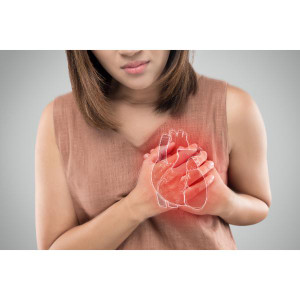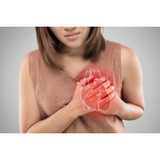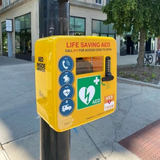What is a sudden cardiac arrest (SCA)?
Sudden Cardiac Arrest (SCA) is a critical medical emergency where the heart abruptly ceases to function, leading to an immediate halt in blood circulation. This sudden cessation can result in loss of consciousness and, if not promptly addressed, can be fatal within minutes.
Understanding Sudden Cardiac Arrest
Unlike a heart attack, which is caused by a blockage impeding blood flow to the heart muscle, SCA is primarily an electrical malfunction that disrupts the heart's rhythm. This disruption often leads to arrhythmias, with ventricular fibrillation being the most common type associated with SCA. In ventricular fibrillation, the heart's ventricles quiver ineffectively instead of pumping blood, leading to a rapid decline in blood circulation.
Common Causes of SCA
Several factors can precipitate SCA, including:
- Coronary Artery Disease (CAD): The most prevalent cause, CAD involves the narrowing or blockage of coronary arteries due to plaque buildup, which can lead to arrhythmias and SCA.
- Structural Heart Abnormalities: Conditions such as hypertrophic cardiomyopathy, characterized by the thickening of the heart muscle, can disrupt normal electrical pathways, increasing the risk of SCA.
- Inherited Arrhythmia Syndromes: Genetic disorders like Long QT Syndrome and Brugada Syndrome affect the heart's electrical stability, making individuals more susceptible to sudden arrhythmic events.
Recognizing the Signs
SCA often occurs without warning. However, some individuals may experience prior symptoms such as:
- Chest Pain or Discomfort: A sensation of pressure, squeezing, or fullness in the chest.
- Shortness of Breath: Difficulty breathing or a feeling of breathlessness.
- Palpitations: Noticeably rapid, strong, or irregular heartbeats.
- Dizziness or Lightheadedness: Feeling faint or unsteady.
It's crucial to note that these symptoms can precede SCA by minutes, hours, or even days. Immediate medical attention is essential if any of these signs are present.
Immediate Response and Treatment
The prognosis of SCA heavily depends on the speed and effectiveness of the response:
- Early Recognition and Activation of Emergency Services: Recognizing the emergency and calling emergency services immediately is the first step in the chain of survival.
- Prompt Initiation of Cardiopulmonary Resuscitation (CPR): Administering high-quality CPR helps maintain vital blood flow to the organs until professional help arrives.
- Rapid Defibrillation: Using an Automated External Defibrillator (AED) can restore a normal heart rhythm. AEDs are designed for public use and provide step-by-step instructions.
- Advanced Medical Care: Upon arrival, emergency medical personnel can provide advanced life support, including medication administration and advanced airway management.
Prevention and Preparedness
While not all instances of SCA can be prevented, certain measures can reduce the risk:
- Regular Health Check-ups: Routine medical examinations can help identify and manage risk factors such as high blood pressure, high cholesterol, and diabetes.
- Lifestyle Modifications: Adopting a heart-healthy lifestyle, including a balanced diet, regular physical activity, and smoking cessation, can significantly lower the risk of heart disease.
- Community Training: Encouraging CPR and AED training within communities can empower bystanders to act swiftly during emergencies, improving survival rates.
Understanding SCA and the critical importance of immediate intervention can save lives. By staying informed and prepared, individuals and communities can make a significant difference in outcomes related to sudden cardiac events.
Be Prepared to Save a Life
Sudden Cardiac Arrest can happen to anyone, anytime, anywhere. Having a defibrillator on hand can make the difference between life and death. Equip your home, workplace, or community with a life-saving defibrillator today.
Don't wait until it's too late – take action and be ready to respond!
Recent Posts
-
What is CPR?
Knowing the basics of first aid and how to deliver CPR (cardiopulmonary resuscitation) can make the …17th Nov 2024 -
What is a sudden cardiac arrest (SCA)?
Sudden Cardiac Arrest (SCA) is a critical medical emergency where the heart abruptly ceases to funct …17th Nov 2024 -
Empowering Communities: The Lifesaving Impact of CPR on Restart a Heart Day
Every year, on and around October 16th, an important event takes place - Restart a Heart Day. This a …16th Oct 2023




